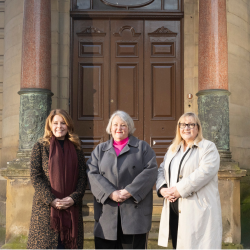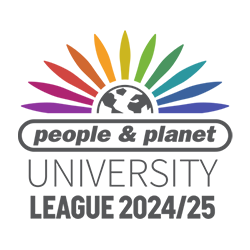-
Study
-
Undergraduate
- Search for a Course
- Undergraduate Open Day & Events
- Application Guides
- Northumbria University UCAS Exhibitions
- Foundation Years
- Undergraduate Fees & Funding
- School & College Outreach
- Continuing Professional Development
-
Postgraduate
- Postgraduate Study Degree
- Postgraduate Research Degrees
- Postgraduate Open Days and Events
- Postgraduate Fees & Funding
- Flexible Learning
- Thinking about a Masters?
- Continuing Professional Development
- Change Direction
-
Student Life
- The Hub - Student Blog
- Accommodation
- Life in Newcastle
- Support for Students
- Careers
- Information for Parents
- Students' Union
- Northumbria Sport
- Be Part of It
-
-
International
International
Northumbria’s global footprint touches every continent across the world, through our global partnerships across 17 institutions in 10 countries, to our 277,000 strong alumni community and 150 recruitment partners – we prepare our students for the challenges of tomorrow. Discover more about how to join Northumbria’s global family or our partnerships.
View our Global Footprint-
Applying to Northumbria
- European Union
- Our London Campus
- Northumbria Pathway
- International Events
- Entry Requirement and Education Country Agents
- Global Offices
-
Northumbria Language Centre
- Faculty Requirements
- Acceptable English Requirements
- Pre-sessional English Language and Study Skills
- Academic Language Skills Programmes (ALS)
-
International Fees, Funding & Scholarships
- International Undergraduate Fees
- International Undergraduate Funding
- International Masters Fees
- International Masters Funding
- International Postgraduate Research Fees
- International Postgraduate Research Funding
- International Money Matters
-
Life at Northumbria
- International student support
- Careers
-
International Mobility
- Current Northumbria Students
- Incoming Exchange Students
-
-
Business
Business
The world is changing faster than ever before. The future is there to be won by organisations who find ways to turn today's possibilities into tomorrows competitive edge. In a connected world, collaboration can be the key to success.
More on our Business Services -
Research
Research
Northumbria is a research-rich, business-focused, professional university with a global reputation for academic quality. We conduct ground-breaking research that is responsive to the science & technology, health & well being, economic and social and arts & cultural needs for the communities
Discover more about our Research -
About Us
-
About Northumbria
- Our Strategy
- Our Staff
- Place and Partnerships
- Student Profiles
- Alumni Profiles
- Leadership & Governance
- Academic Departments
- University Services
- History of Northumbria
- Contact us
- Online Shop
-
-
Alumni
Alumni
Northumbria University is renowned for the calibre of its business-ready graduates. Our alumni network has over 246,000 graduates based in 178 countries worldwide in a range of sectors, our alumni are making a real impact on the world.
Our Alumni - Work For Us
What will I learn on this module?
Historically, family businesses have been (and remain) the most prevalent form of business ownership, demonstrating distinct characteristics and spread across different national economic models and over time. Family-owned business and family entrepreneurship have played a significant role in regional, national, and international development. This module will provide students with a long-term and wide-ranging perspective on the development of family business in different international contexts across the last two centuries. It will explore key themes and core concepts relating to survival, longevity, change over time, emergent strategies, innovation, risk-taking, transmission of skills and values and emotions. In this context students will explore the key processes involved in the adaptations and adjustments to increased competition, new technologies, global transitions, and international crisis. Students will also be introduced to sources and methods for examining the development of family business and learn research methods and forms of analysis that will enhance their understanding of historical processes.
How will I learn on this module?
The module will be delivered by lectures (1 hour) and seminars (2 hours) and will be assessed by a 3000-word assignment at the end of the semester (60%) and by group presentations (40%). The students will be supported by the module leader, guest lecturers, module tutors and seminar leaders. Academic staff will deliver lecturers in their specialist area. Family business owner-managers will provide materials to supplement their interactive sessions during which they can reflect on the history, development, crisis management and longevity of their own multi-generational long-lived family firms. Seminar groups will be limited to around 20 students to encourage more close, personal and focused learning building on themes/content covered in lectures. Sessions will be devoted to essay surgery and feed-forward sessions and rehearsal of group presentation delivery. The module will be supported via the e-learning portal, Blackboard Ultra, where materials and slides from lectures, seminars, guest lectures and external speakers will be loaded. This will include detailed breakdowns of assessment and submission criteria, instructions, and deadlines. Microsoft Teams will provide an outlet for group chat instant feedback and up-to-date module announcements. A detailed reading list will provide weekly reading materials compiled from journal articles, textbooks, web resources and company websites. This will be supplemented by a broader reading list detailing seminal texts in key areas of family business and entrepreneurial history.
How will I be supported academically on this module?
You will be supported through this module by the Module Tutor and the wider teaching team who all have relevant expertise in the subject area; students will be able to arrange 1-2-1 appointments with the module team if necessary. You will also support each other. There will be an emphasis on active student participation in seminars and this is partly to help foster collegiality and informal collaboration.
You will have access to a Blackboard site for the module, which will provide you with all the necessary learning materials, assessment guides, and a discussion board to address module queries. A full electronic reading list will be also made available, allowing you to access the necessary reading materials. For the assessment, there will be in-class time allocated to help students prepare for each component.
What will I be expected to read on this module?
All modules at Northumbria include a range of reading materials that students are expected to engage with. Online reading lists (provided after enrolment) give you access to your reading material for your modules. The Library works in partnership with your module tutors to ensure you have access to the material that you need.
What will I be expected to achieve?
Knowledge & Understanding:
1 By examining its long-term development, to acquire an in-depth understanding of the global business environment (MLO1)
2 To understand how business practice(s) have adapted to changing environments (MLO2)
Intellectual / Professional skills & abilities:
3 Ability to communicate complex and varied information in writing and verbally (MLO3)
Personal Values Attributes (Global / Cultural awareness, Ethics, Curiosity) (PVA):
4 To appreciate the variability of national and regional growth trajectories, and the consequences thereof (MLO4)
How will I be assessed?
Formative assessment:
The seminar sessions will be collaborative and will require students to participate in group tasks such as presentations and debates. Formative feedback will be provided by tutors and peers in these sessions which will help students achieve the MLOs.
Summative assessment:
The summative element of the assessment is made up of two components.
Component 1: (40%) In groups or 4 or 5, drawing upon relevant theory covered during lectures and applying methods covered in seminar/workshops, students will work on a team project in which they will evaluate, analyse, articulate and visualise the long-term development, growth and transitions of an extant family business and/or entrepreneurial family firm highlighting the key factors in their endurance, success and continuity. This will assess MLO1, MLO2, MLO3 and MLO4
Component 2: (60%) Students will write a 2500-word essay exploring a facet of family business or family-focused entrepreneurship as applied to a teaching case study. This will test students' ability to engage in personal research, to analyse quantitative and qualitative evidence, and to deploy this evidence to explore a detailed question. It will also test their ability to deploy basic economic concepts related to growth and development. This component will be weighted at 60% and will assess MLO1, MLO2 and MLO3.
Pre-requisite(s)
None
Co-requisite(s)
None
Module abstract
This module introduces students to the dynamic world of family business and entrepreneurial history. Students will examine the core factors in the endurance, survival, and adaptability of evolution of family businesses in a multitude of different international and commercial context. This module will analyse the role of entrepreneurs in driving national economies and regional development and enable students to understand how entrepreneurial processes develop and change over time. Students will be able to draw upon key theories and practical solutions which enable family firm leaders and entrepreneurs to grow their enterprise in an increasingly dynamic, competitive, and uncertain global context. By engaging with historical theory and applying historical methodologies to business phenomena students will enhance their research skills and their knowledge of the evolution of global business environments.
Course info
Credits 20
Level of Study Postgraduate
Mode of Study 1 year Full Time
1 other options available
Department Newcastle Business School
Location City Campus, Northumbria University
City Newcastle
Start September 2025
All information is accurate at the time of sharing.
Full time Courses are primarily delivered via on-campus face to face learning but could include elements of online learning. Most courses run as planned and as promoted on our website and via our marketing materials, but if there are any substantial changes (as determined by the Competition and Markets Authority) to a course or there is the potential that course may be withdrawn, we will notify all affected applicants as soon as possible with advice and guidance regarding their options. It is also important to be aware that optional modules listed on course pages may be subject to change depending on uptake numbers each year.
Contact time is subject to increase or decrease in line with possible restrictions imposed by the government or the University in the interest of maintaining the health and safety and wellbeing of students, staff, and visitors if this is deemed necessary in future.
Useful Links
Find out about our distinctive approach at
www.northumbria.ac.uk/exp
Admissions Terms and Conditions
northumbria.ac.uk/terms
Fees and Funding
northumbria.ac.uk/fees
Admissions Policy
northumbria.ac.uk/adpolicy
Admissions Complaints Policy
northumbria.ac.uk/complaints














